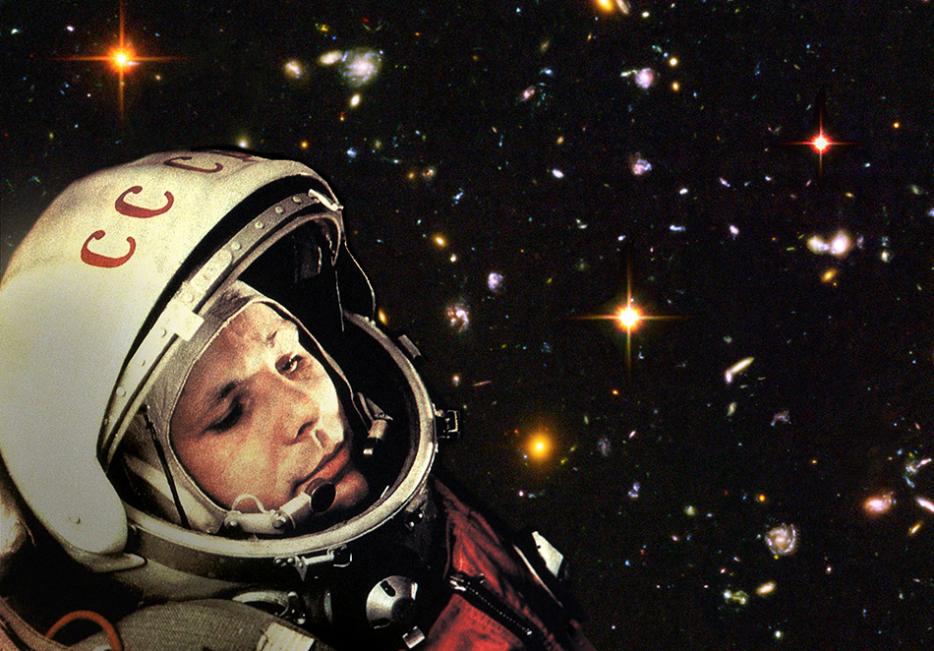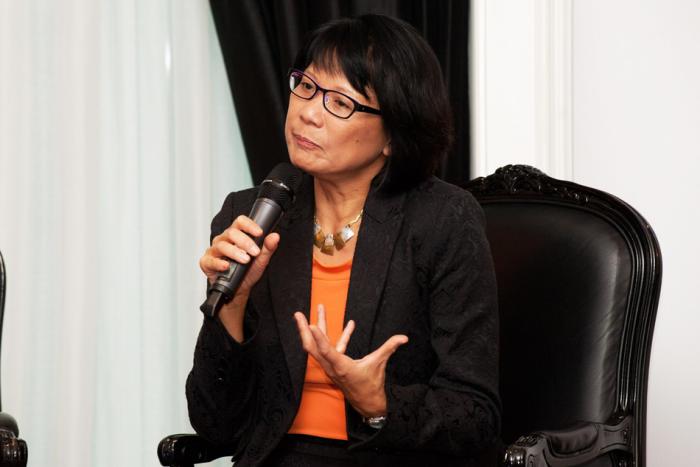In December two members of Pussy Riot, fresh out of jail, held a press conference in Moscow. Nadezhda Tolokonnikova, aka “Nadya Tolokno,” made it clear that her position on Vladimir Putin, in case anyone still wondered, had not mellowed in prison: “We’d like him to go away,” she said. “I think he believes that Western countries are a threat, that it’s a big bad world out there where houses walk on chicken legs and there is a global masonic conspiracy. I don’t want to live in this terrifying fairytale.”
The reference might have been lost on Western reporters, but not the Russians, who would know the story of Baba Yaga from folklore: Baba Yaga is a witch who lives in the forest in a house built on chicken legs, who kidnaps children and eats their bones. For the record and in fairness, Vladimir Putin has only ever accused Western liberals of being “genderless and infertile” (in a state-of-the-union address two weeks before the Pussy Riot presser) but never of eating the bones of children, and on the issue of modern Russia as a fairytale of his own invention, it’s not something he’s ever openly denied.
To the contrary: last summer while on a fishing trip in Tuva near the Mongolian border, Putin caught a 21-kilogram pike (that’s big, by pike standards) which he held up and kissed for the benefit of photographers. Again, for non-Russians this was more eye-rolling shirtless bravado, but the stunt was meant for domestic consumption, for those who knew the old tale of Yemelya and the magic pike. Yemelya, while ice-fishing, catches the magic pike which begs for its life and agrees to grant the boy any wish he desires in exchange for its freedom. So Yemelya lets the fish go. By the end he lives in a grand palace with lush gardens, marries the Tsar’s daughter, and then becomes Tsar himself. The moral of the story is simple: the Tsar is blessed with powers the rest of us can only dream of, so trust him.
Pop history remembers Khrushchev as a gap-toothed fireplug peasant, out of his depth on the world stage, best known for almost causing World War III by parking nuclear missiles in Cuba, and for arguing with Richard Nixon about who had the better kitchen appliances: Americans or Soviets.
This is the story of pre-revolutionary Russia and Stalin’s Soviet Union and now modern Russia. Forget parliamentary consensus and all the other democratic nuisance, all you need to know is that Putin’s in charge and miracles will follow, both economic and social. He knows what he’s doing. He caught the magic pike. Putin’s kiss was a signal that all would be well with Sochi, with the war to preserve “family values”, with Russia’s fragile petrodollar and the party of oligarchs who keep it all running. The fishing trip to Tuva was the real state-of-the-union address.
The irony, for a free marketeer like Vladimir Putin, is that this is how the old Soviets used to frame things: the state as a real-time simulation of a folktale with a happy ending. In 1959, Soviet leader Nikita Khrushchev told a stadium crowd in Moscow that “[i]n our day, the dreams mankind cherished for ages, dreams expressed in fairytales which seemed sheer fantasy, are being translated into reality by man’s own hands.” His hope was to assure comrades that (a) after Stalin they were less likely to be shot in the head for no good reason, and; (b) an honest attempt was underway not only to overtake American capitalism in economic growth, but to make every Soviet citizen rich. `
“If communism couldn’t give people a better life than capitalism,” writes Francis Spufford in the 2010 novel Red Plenty, “he personally couldn’t see the point. A better life, in a straightforward, practical way: better food, better clothes, better houses, better cars… better football games to watch and cards to play and beaches to sit on, with the children splashing about in the surf and a nice bottle of something cold to sip.” Happily ever after. Of course we can never know what really went through Khrushchev’s mind, so Spufford makes it up: the book is fiction, but with a thick chapter of footnotes at the end to give it historical heft. In fact, better to call it a hybrid of fact and fiction: real events, real people made brisk and story-like through the author’s imagination. “This is not a novel,” writes Spufford off the top in a kind of Nabokov tease. “Best to call this a fairytale.”
Pop history remembers Khrushchev as a gap-toothed fireplug peasant, out of his depth on the world stage, best known for almost causing World War III by parking nuclear missiles in Cuba, and for arguing with Richard Nixon about who had the better kitchen appliances: Americans or Soviets. He prompted the space race by putting the first dog (poor, doomed Laika) into orbit and in the so-called Secret Speech he blew the whistle on Stalin’s horrible crimes. Red Plenty, however, is more interested in the lesser-known story of Khrushchev’s economic reforms and how, for a brief moment, it looked like the Soviet fairytale of overtaking the Baba Yagas of capitalism might actually come true.
The story is told in tied vignettes featuring both made up characters and real historical figures, and mathematicians and economists—unlikely protagonists for fairytales—are the heroes. In Stalin’s time, scientists had to bow to ideology and tailor their “results” accordingly. Khrushchev gave them room to breathe. So they came up with a plan: instead of relying on bureaucrats, who’d based production quotas for everything from sausages to underpants on passages they’d underlined in Marx’s Capital, they’d use hi-tech cybernetics and game theory to manage a real-world economy on a grand, modern scale. (Check the footnotes: this really happened.) And it worked. “For a while, in the late 1950s and early 1960s,” Spufford writes, “people in the West felt the same mesmerised disquiet over Soviet growth that they were going to feel for Japanese growth in the 1970s and 1980s, and for Chinese and Indian growth from the 1990s on. Nor were they being deceived. Beneath several layers of varnish, the phenomenon was real.” It was the triumph not of mass military displays in Red Square, but the Russian nerds who shoved punch cards into a computer.
Then it all went sour, the fairytale with the unhappy ending. Khrushchev’s plan failed. The culprits: human vanity, corruption, fear, the stuff of Greek tragedy. Factory managers, unable to meet profit targets, would sabotage their own equipment rather than accept personal blame for letting down the team. Scientists argued, ideologues argued. Khrushchev’s political foes in the Kremlin, with one eye on his “retirement,” couldn’t get their heads around such decadent notions as profit and pricing, and thought it better to just wrap the whole thing up. The computers were powered down, Brezhnev took over, and the Soviet economy fell into a slumber from which it never awoke. Western free-marketeers breathed a sigh of relief.
Red Plenty, part fiction and part history (the footnotes help you sort out which is which), is a kind of parable about the real Soviet economic miracle that almost was. You get to wonder what would have become of the Soviet Union if the Khrushchev reforms had been fed rather than choked. Would the USSR still have collapsed in the ‘90s? Would the Sochi Olympics be a Soviet Olympics? But it’s also possible to read Red Plenty as a stealth fairytale about the West, where corporate subsidies and preferential tax breaks, the dismantling of collective bargaining rights and the vilification of labour, all add up to another kind of planned economy: a fixed game. The “free” market is also a myth, where everyone has a shot at catching the magic pike but only 1 percent actually pull it off, by deliberate design.
In the end, Spufford writes, “Can it be, can it be, can it ever be otherwise?” It’s an urgent question, not just in Putin’s Russia but in the west, and it’s a question the Occupy movement has been asking over and over. But then the Occupy movement has always been blamed for its one, significant failing: it hasn’t come up with a good fairytale. Yet.






